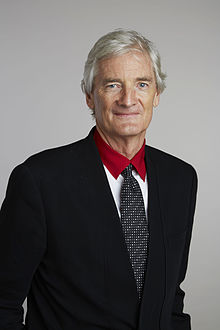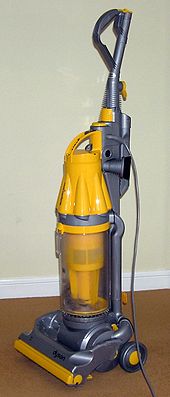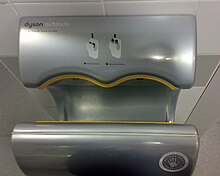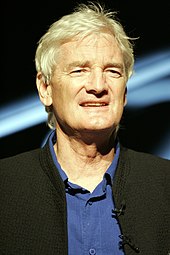Political views
Pro-Eurozone
In 1998, Dyson was one of the chairmen and chief executives of 20 FTSE 100 companies who signed a statement published in The Financial Times calling on the government for early British membership of the Eurozone. He claimed that failure to join the euro would lead to the destruction of the British manufacturing base and said: "It does not mean that the jobs will go tomorrow but will drift abroad over a period and the longer-term future of Britain as a manufacturing nation will be blighted. Ministers had better understand that if we delay entry too long there may be nothing left to save."
Claiming that the strength of the pound was affecting his company's profits on exports to France and Germany, in February 2000 Dyson threatened to shift focus from his Malmesbury plant to a new plant set up in Malaysia because the government would not join the euro. He said: "We would expect to double in size in the next two years. We are talking about a £100 million investment and up to 2,000 jobs. I would like to make that investment in the UK. But it seems that is not going to be possible. The value of sterling means we are struggling to compete at home with cheap imports from Europe and the Far East. We do around £40 million worth of export business with France and Germany each year but we aren't making any money. If we joined the euro we would be on an even footing with our biggest trading partners." An editorial published in The Times responded: "Mr Dyson, a manufacturing version of Sir Richard Branson, likes complaining. Yesterday he was complaining that Britain's failure to join the euro and the resultant strong pound will force him to move abroad. Last week he blamed the price of land and planning delays in Wiltshire, but never mind. So where will he go? To Portugal, Italy or to an EU candidate such as Poland? No, Mr Dyson threatens to go to the Far East. Like so many entrepreneurs, he wants a cheap currency and low interest rates, but also low inflation, low wages, a flexible labour market and low regulation. He will not find them in the eurozone."
Dyson again threatened to shift production abroad in November 2000, saying: "It's suicidal for the UK not to join the euro. Why should we go on exporting at a loss? We're facing unfair competition." In February 2002, Dyson announced that production was being shifted to the Far East. In August 2003, the assembly of washing machines was also switched from Malmesbury to Malaysia.
Pro-Brexit
Dyson was one of the most prominent UK business leaders to publicly support Brexit before the referendum in June 2016. Since the referendum, Dyson has stated that Britain should leave the EU Single Market and that this would "liberate" the economy and allow Britain to strike its own trade deals around the world. During 2016, 19% of Dyson Ltd exports went to EU countries, compared with 81% to non-EU countries. In 2017, Dyson suggested that the UK should leave the EU without an interim deal and that "uncertainty is an opportunity". Previously, in 2014, Dyson had said he would be voting to leave the European Union to avoid being "dominated and bullied by the Germans". In November 2017, Dyson was critical of the UK government Brexit negotiations and said "we should just walk away and they will come to us". After it became public in January 2019 that Dyson's company was to move its headquarters from Malmesbury to Singapore, he was accused of hypocrisy regarding his campaign for Brexit.
European Court of Justice
In November 2015, Dyson lost its case against EU energy labelling laws in the European General Court; however, a subsequent appeal in the European Court of Justice said that the previous ruling had "distorted the facts" and "erred in law".
Rishi Sunak
Dyson attacked Prime Minister Rishi Sunak in January 2023 for what he called "ever higher tax bills" for corporations, accusing the PM of believing that "penalising the private sector is a free win at the ballot box". In May of the same year, Dyson said that Sunak had a "scandalous neglect" of the science and technology sector. Dyson's interventions into UK politics led to the New Statesman naming him the British Right-Wing's 35th most influential figure.
In March 2024, Dyson was reported in the Financial Times to have had a "fiery exchange" with Chancellor of the Exchequer Jeremy Hunt in a private meeting to discuss research and tax relief. Hunt is reported to have challenged Dyson to "stand for election" in response to his criticism of Government economic policy, which he has previously criticised for being "low growth", having backed the economic policies of Liz Truss and Kwasi Kwarteng that led to the 2022 mini-budget.




